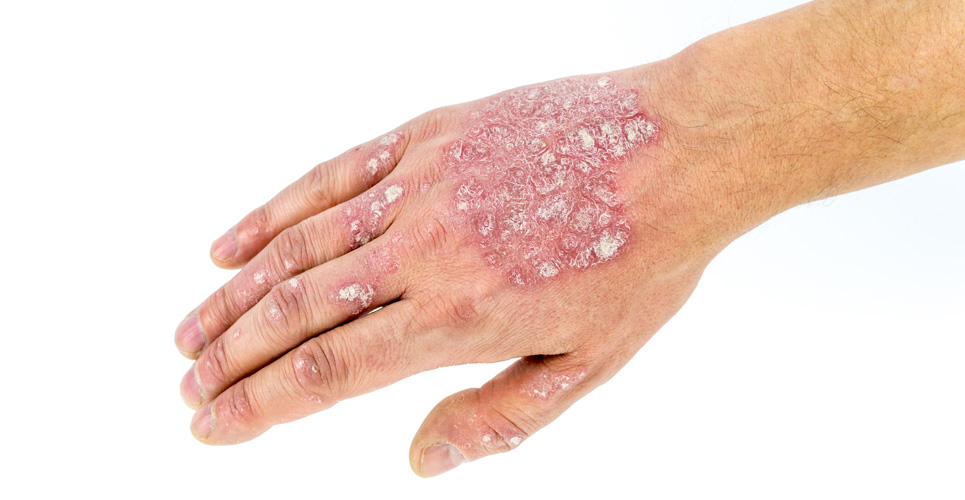Interim results from one of the largest and longest clinical trials ever conducted for a topical treatment in psoriasis* showed that after eight weeks of treatment with calcipotriol/betamethasone dipropionate (Daivobet® gel), the treatment was highly efficacious, preferred by patients and improved patients’ and the physicians’ assessments of disease severity. (1)
Interim results from one of the largest and longest clinical trials ever conducted for a topical treatment in psoriasis* showed that after eight weeks of treatment with calcipotriol/betamethasone dipropionate (Daivobet® gel), the treatment was highly efficacious, preferred by patients and improved patients’ and the physicians’ assessments of disease severity. (1)
Published in the Journal of the European Academy of Dermatology Venereology (JEADV), the PSO-TOP (PSOriasis Treatment OPtimisation) study blinded interim analysis assessed 1,795 patients across Europe who had not responded sufficiently to previous treatments. Following eight weeks of treatment with calcipotriol/betamethasone dipropionate gel, both patients’ and the physicians’ assessments of disease severity significantly improved. Over a third of patients (36.5%) were ‘clear’ or ‘almost clear’ of psoriasis symptoms (compared to 0% at baseline), in a population of patients with mild to severe. Psoriasis severity ratings on the PGA scale who had not responded to previous topical treatment. (1)
In addition, approximately nine out of ten patients# preferred calcipotriol/betamethasone dipropionate gel compared with their previous treatment. (1) Patient preference is one of a number of factors affecting adherence to treatment, a major issue in the management of psoriasis. (2)
Professor Kristian Reich, lead PSO-TOP investigator from Dermatologikum Hamburg, Germany, commented:
“The interim results from PSO-TOP show patients have a strong preference for calcipotriol/betamethasone dipropionate gel, assessed by comparing patient perceptions of effectiveness, side effects, ease of use and overall preference. These data are of particular importance as the study mimics “real-life” and was conducted amongst clinically challenging patients with long-standing psoriasis who did not respond sufficiently to previous treatments. The data confirm the value of topical psoriasis therapy to both physicians and patients.”
First study of its kind
PSO-TOP is the first trial to assess whether a tailored patient education and support programme can improve adherence to topical therapy and increase clinical effectiveness for people with psoriasis in a real-world environment.
The investigators chose calcipotriol/betamethasone dipropionate gel as the treatment option as they considered it to be the global ‘standard of care’. (1) It is a highly efficacious and well-tolerated topical combination therapy for mild-to-moderate psoriasis, which increases patient adherence in the real world. (1)
Half the patients were randomised to support by the Topical Treatment Optimisation Programme (TTOP), which aims to improve adherence by increasing psoriasis and treatment information provided to patients, as well as improving the physician-patient relationship. TTOP, designed by SCIderm (headed by clinical psychologist Dr Ina Zschocke) was developed with patients and medical experts from across Europe. (3)
Improving patient outcomes
Psoriasis is a chronic inflammatory skin disease and, with a prevalence of approximately 2-3% affecting 25 million people in North America and Europe, is one of the most common human skin diseases.1 Psoriasis causes significant morbidity and has profound effects on patients’ quality of life, affecting day-to-day activities and social interactions. (4)
Topical treatment represents the mainstay of therapy for patients with mild to moderate psoriasis and is recommended as first line intervention in this group of patients. (5) However, real life adherence to topical psoriasis therapies is often very low, with up to three quarters (73%) of patients not using their medication as prescribed. (2) Low adherence has a negative impact on clinical effectiveness in the real world, outside clinical trials.
Professor Ulrich Mrowietz, joint lead investigator for PSO-TOP, from the Psoriasis-Center, Department of Dermatology, University Medical Center Schleswig-Holstein, Campus Kiel, Germany, added:
“One of the greatest unmet needs in psoriasis is adherence to topical treatment. Our aim with PSO-TOP is to demonstrate that adherence and clinical effectiveness of psoriasis treatment in a real life setting can be improved as a result of optimised patient education and support, partnered with a treatment that has been shown to be preferred by patients. The full impact the TTOP in combination with calcipotriol/betamethasone dipropionate gel has on adherence will become evident when the full 64-week data are published. PSO-TOP has the potential to drive significant change in the way that doctors support their psoriasis patients through a truly holistic approach.”
References:
- 1. Reich K, et al. Efficacy of a fixed combination of with calcipotriol/betamethasone dipropionate topical gel in adult patients with mild to moderate psoriasis: blinded interim analysis of a phase IV, multicentre, randomized, controlled, prospective study. Journal of European Academy of Dermatology Venereology 2014: October (epub ahead of print) DOI: 10.1111/jdv.12774
- Bewley A, Page B. Maximising patient adherence for optimal outcomes in psoriasis. Journal of the European Academy of Dermatology and Venereology. 2011, 25 (Suppl. 4), 9–14
- Reich K, et al. Development of an adherence-enhancing intervention in topical treatment termed the topical treatment optimization program (TTOP). Archives of Dermatological Research 2014 Jun 4. [Epub ahead of print]
- Lebwohl M, et al. Patient perspectives in the management of psoriasis: Results from the population-based Multinational Assessment of Psoriasis and Psoriatic Arthritis Survey. J Am Acad Dermatol 2014; 70(5): 871–81
- Devaux S, et al. Adherence to topical treatment in psoriasis: a systematic literature review. Journal of the European Academy of Dermatology and Venereology. 2012, 26 (Suppl. 3), 61–67

